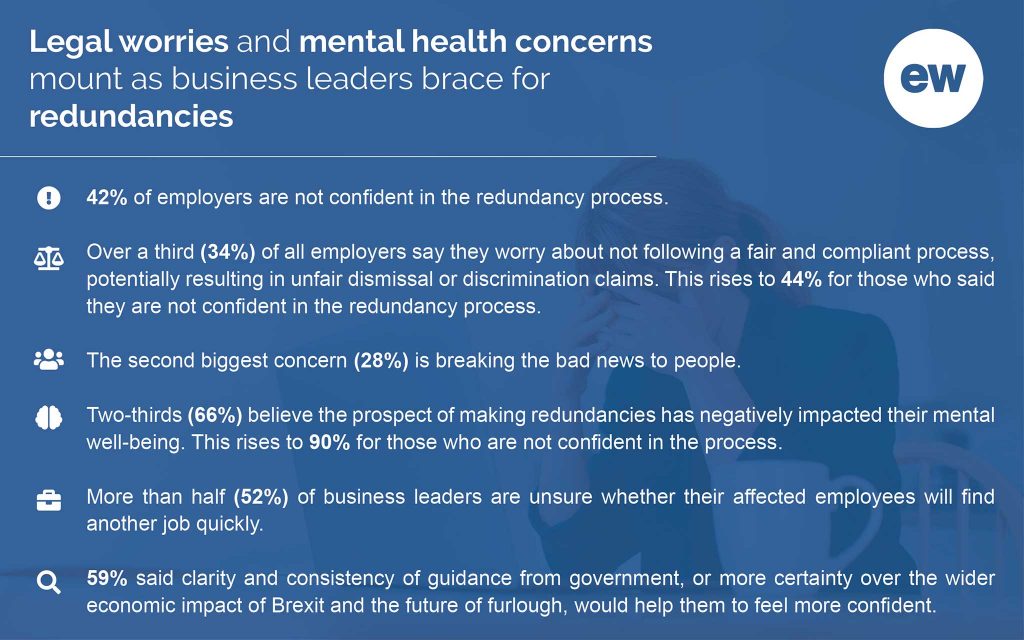BLOG
Legal worries and mental health concerns mount as business leaders brace for redundancies
- Employers’ greatest concern when making redundancies is the legal risk.
- Prospect of making redundancies has negatively impacted two-thirds of leaders’ mental wellbeing.
- No cost to employee to raise an Employment Tribunal claim.
Despite the last-minute extension of the furlough scheme, new research conducted among UK business leaders has revealed that great concern remains around making redundancies and in particular the legal risk.
Over a third (34%) say they worry about not following a fair and compliant process, potentially resulting in unfair dismissal or discrimination claims. This is greater than the 28% who said their biggest concern is breaking bad news to people and the personal impact on them.
The survey of over 440 UK business leaders, conducted by Employment Law and HR support firm Ellis Whittam, also found two-thirds (66%) believe the prospect of making redundancies has negatively impacted their mental wellbeing.
According to the Ministry of Justice, a big rise in Employment Tribunals is predicted once the furlough scheme ends. In recent official statistics showing Tribunal claims surged during the first lockdown period this year, they commented that: “This rise in employment receipts is likely to continue as the government’s job retention scheme comes to an end at the end of October.” While the furlough scheme has since been extended into the spring, it remains a difficult time ahead for many business leaders.
Employers potentially face a huge challenge, as since 2017, there has been no cost to the employee to raise a claim.
Related READING


Free Download: Business Leaders Redundancy Survey
Ellis Whittam surveyed 443 business leaders who have responsibility for employment and redundancy matters in their organisation to find out how managing the process has impacted them.
James Tamm, Director of Legal Services at Ellis Whittam, said: “In an environment where redundant employees don’t think they will get another job quickly, and in an increasingly litigious culture, employers are bound to face more and more time spent dealing with claims from employees that are trying to get money from every potential source. This stands to put even more stress on business leaders and their organisations.”
The research also found that more than half (52%) of business leaders are unsure whether their affected employees will find another job, given the state of the economy and how things are in their sector.
59% said clarity and consistency of guidance from government, or more certainty over the wider economic impact of Brexit and the future of furlough, would help them to feel more confident.
“Besides the tremendous difficulty redundancies will put on more households, we can’t forget this country’s SME business leaders, who are the lifeblood of so many industries,” added James Tamm.
“The UK economy is built on such companies and many of these leaders have strong personal ties to not only their business but also the people they employ and, in many cases, will now be having to make redundancies. With all the pressures of the current crisis we need these SME business leaders to lead the charge of recovery. We as a nation can’t afford for them to feel mentally jaded, yet two thirds of them are telling us that they are.”

Expert advice, guidance and reassurance
When it comes to redundancy, the right advice and support can make all the difference, giving managers the confidence they need to navigate the process, plus the reassurance of dramatically reduced legal risk.
To find out how Ellis Whittam’s highly-skilled Employment Law specialists can help you turn this complex exercise into a series of manageable steps and make the process as painless as possible, call 0345 226 8393 or find out more about our redundancy support.
Sign up for the latest news & insights
Resources
Latest News & Insights

Language of appreciation at work | Why individual motivation matters
BLOG Written by Becs Bridge, Director of Learning & Development, on 23 January 2026 For business leaders and managers, understanding motivational drivers are a core

Recruitment trends 2026 | 7 things to expect when hiring this year
BLOG Written by Danielle Fargnoli-Read on 22 January 2026 If there’s one thing recruitment has taught us over the past few years it is that

Breach of employment contract | What employers need to know to avoid Tribunal claims
BLOG Written on 15 January 2026 Breach of contract is a common concern for businesses, particularly during resignations, dismissals, or disputes over pay, notice, or

When does the Employment Rights Bill come into effect?
BLOG Written on 19 December 2025 It’s been the most talked-about topic in HR in 2025 – and the question everyone’s been asking is “when

Workforce planning | Structuring your business for success
BLOG Written by Danielle Fargnoli-Read on 17 December 2025 Strategic workforce planning is a vital business process that’ll align your organisational needs with long-term goals.

Changes to day one unfair dismissal rights | New six-month protection explained
BLOG Written by Patrick Carroll-Fogg on 1 December 2025 Of the almost 75 individual tweaks and changes set to be introduced under the Employment Rights

Breaking down the Budget 2025 for employers
BLOG Written by Daniel Rawcliffe on 27 November 2025 The recently announced UK Budget 2025 is a challenging one for small businesses. While it covers

AI for interviews with job candidates | Balancing technology with a human touch
BLOG Written by Danielle Fargnoli-Read and Tracey Burke on 21 November 2025 Businesses using AI for interviews are reshaping the way UK businesses approach hiring,

Workplace risks revealed | HSE 2024/25 report shows rising injuries and ill health
BLOG Written on 21 November 2025 Providing a safe, healthy workplace should be a top priority for all employers. But how well are workplaces actually
